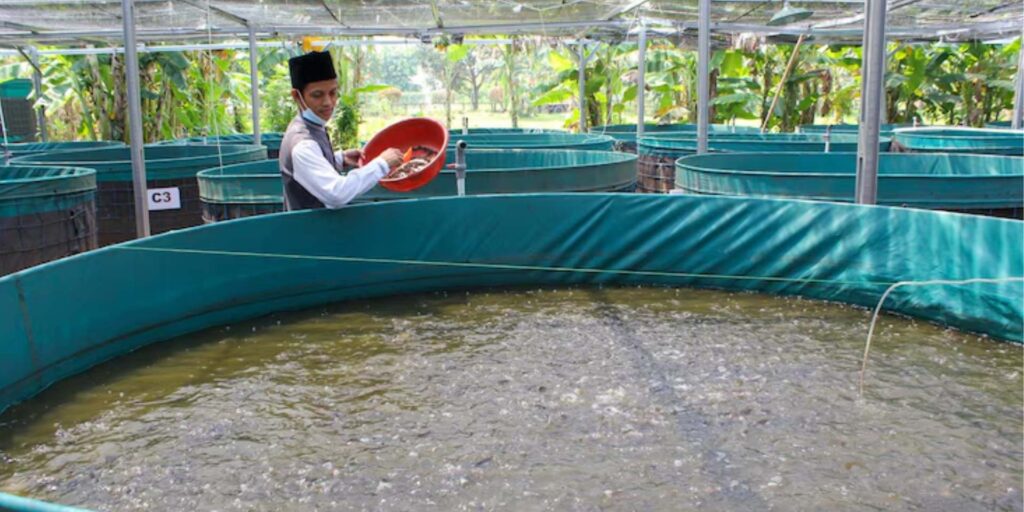The Indian business landscape is changing dynamically, and rural India is becoming a hub of dynamic entrepreneurial centers. With over 915 million inhabitants in its villages and accounting for over 65% of India’s population, they present vast opportunities for sustainable and profitable business enterprises waiting to be tapped. These massive consumer bases, combined with rich natural resources and a constantly evolving digital framework, are fueling a new entrepreneurship boom.
Government initiatives such as the ‘Vocal for Local’ initiative and other rural schemes are actively promoting and incentivizing local entrepreneurship, too. Village business concepts range from ancient, agrarian-based enterprises to high-tech, technology-driven services, with far-reaching effects that contribute substantially to rural economies and self-sufficiency.
Rural entrepreneurship is an integral part of overall economic development in India, with Micro, Small, and Medium Enterprises (MSMEs), which predominate in rural India, contributing around 30% of the Indian GDP. In this article, we will explore some of the most promising and successful village business ideas that are transforming rural landscapes and creating new opportunities for entrepreneurs across India.
Why Villages/Rural Areas Present Unique Business Opportunities
Rural India presents a unique opportunity for entrepreneurs to launch successful businesses. Low operating costs and living expenses, combined with the availability of land and a compact community, often result in lower overheads and a loyal client base. Additionally, the growing interest in organic food, home crafts, and authentic experiences among urbanites gives an immediate market for village products and services. These and many more factors, with the growing emphasis on green operations, provide rural India with the fertile ground on which to take root new and village-based concepts for village business.
Benefits of Business in Rural Areas
A village business idea in India has several distinct advantages that will significantly contribute to its ultimate success and longevity.
- Reduced Operating Expenses: Rural zones have lower land charges, rents, and labor costs relative to urban areas. This drastically cuts down the initial cost of starting a village business concept, as well as the regular operating expenses.
- Reduced Competition: Several key services and niche products are under-serviced in Indian villages, rendering them an unexplored blue ocean market for new startups. This would result in quicker market penetration and greater profit margins for a well-executed village business concept.
- Access to Local Resources: Indian villages will be endowed with natural resources like crops, raw craft materials, and skilled local labor. Harnessing these available resources will simplify supply chains and reduce the production costs of several village business ideas.
- Strong Community Support: Rural communities in India are typically close-knit, and local businesses often enjoy strong loyalty. Word-of-mouth publicity is effective, and community support can be an effective success driver for a village business idea.
- Government Schemes and Subsidies: The Indian government encourages rural development through the implementation of various schemes, subsidies, and financial support initiatives, including the MUDRA Yojana, PMEGP, and funds provided by state governments. These incentives can be beneficial for new village business initiatives and help in curbing expenses.
List of Top Village Business Ideas
1. Organic Farming

Organic farming is one of the most lucrative and green business opportunities in India, where crops are grown without the help of synthetic pesticides, fertilizers, or genetically modified organisms. With increasing urban demands for organic and chemical-free food, the Indian organic food market was valued at $1.58 billion in 2023 and is projected to reach $8.9 billion by 2032. The venture involves understanding soil conditions in the region, utilizing organic methods of pest control, such as the application of neem-based pesticides, and adhering to the process of organic certifications. Creating direct connections with city buyers or organic food shops, possibly through websites, can lead to enhanced profitability and build a robust brand for your organic village entrepreneurial venture.
- Average Investment Required: ₹50,000 – ₹2,00,000 (depending on land size, initial equipment, and crop)
- Profit Margin: 20% – 40%
- Resources: Arable land, organic seeds, natural manures (e.g., cow dung manure, vermicompost), water supply, agricultural tools, labor, expertise in organic farming
2. Apiculture or Bee-keeping
Apiculture, also known as beekeeping, is an excellent village business ideas that generates multiple sources of income in India, primarily from honey production, beeswax, propolis, and pollination services for local agriculture. India is one of the major honey-producing nations, with a yearly production capacity of approximately 1.25 lakh metric tons (MT) as of 2023. The business involves initial investment in beehives, safety accessories, and training from organizations such as Khadi and the Village Industries Commission (KVIC). Still, it provides a high rate of return on investment with low operating expenses. It’s a sweet business for a sustainable village enterprise.
- Average Investment Required: ₹10,000 – ₹50,000 (for the initial hives, bees, and equipment)
- Profit Margin: 30% – 60%
- Resources: Bees, beehives, bee colonies, protective clothing, honey extractor, knowledge of beekeeping skill
3. Fish Farming

Fish farming, also known as aquaculture, is a highly lucrative village business ideas in India, particularly in regions with access to freshwater resources such as ponds, rivers, or borewells. India is the world’s second-largest producer of fish and is estimated to increase a whopping 184.02 lakh tons during 2023-24, up from 95.79 lakh tons during 2013-14. The operation entails creating fish ponds (or biofloc tanks), selecting appropriate indigenous fish species (such as Rohu, Catla, Mrigal, or Tilapia), and managing their feeding and rearing. With suitable planning and management, fish farming is a lucrative venture, as it can supply a predictable amount of fresh fish to the local and surrounding markets, thereby presenting an excellent village business opportunity.
- Average Investment Required: ₹20,000 – ₹1,00,000 (pond size, species of fish, and infrastructure)
- Profit Margin: 25% – 50%
- Resources: Pond or tank, fish fingerlings, fish food, aeration system, water testing kits, fish culture techniques knowledge
4. Dairy Farming
One of the best Agriculture Business Ideas, Dairy farming is an ancient yet enduring village business in India that meets the basic requirement for milk and milk products. India is proud to have the world’s largest dairy sector, accounting for 24% of the total global milk production and contributing 5% to the Indian economy. A well-planned dairy farm can guarantee a fixed income. This venture involves breeding cattle (including native cow breeds and buffaloes), their health and nutrition, and arranging for milk collection and distribution. Value-added products such as desi ghee or paneer also help raise profitability. It is a relatively easy venture for most rural Indian economies.
- Average Investment Required: ₹50,000 – ₹3,00,000 (cattle, shed, milking machine, and fodder)
- Profit Margin: 15% – 30%
- Resources: Dairy cattle, shed, fodder, milking equipment (manual or automatic), refrigeration, veterinary services
5. Poultry Farming

Poultry farming, or chicken farming to produce meat or eggs, is a very scalable and profitable village business ideas. India has produced 138.38 billion eggs during 2022-23 and is the second-largest egg-producing nation in the world. This venture needs a good shed, good feed management, and good vaccination of the poultry birds at the correct time. It can be initiated on a small scale and then scaled up gradually as demand increases; therefore, it’s a very flexible and low-cost village business venture for the majority of entrepreneurs in India.
- Average Investment Required: ₹10,000 – ₹50,000 (initial birds, shed, and feed)
- Profit Margin: 20% – 40%
- Resources: Poultry birds (broilers, layers, or country chicken), shed, feed, waterers, feeders, vaccination schedule
6. Spice / Organic Processing Units
Starting a spice or organic processing unit is a highly viable business venture in rural areas that adds significant value to locally cultivated agricultural produce in India. India is the largest producer, consumer, and exporter of spices in the world. Instead of selling raw herbs or spices, it can raise their market value many times by processing them in powder, paste, or essential oil form. The operation includes procurement and processing equipment (like grinders and pulverizers), quality testing, and selling the processed goods in packaged form. Both men and women can do this job. Marketing these processed goods to urban markets, online retailers such as Amazon, or direct customers can mean higher margins and create a distinct brand for your village business concept.
- Average Investment Required: ₹30,000 – ₹1,50,000 (machine price, packaging material, and raw materials)
- Profit Margin: 25% – 50%
- Resources: Organically grown fruits/raw fruits, processing equipment, packaging material, quality management skills, FSSAI certification
7. Agri-equipment Rental
Most small and marginal village farmers in India lack the funds to purchase costly agricultural equipment due to financial constraints. A viable and highly needed village entrepreneurial venture is an agri-equipment rental business that fits the bill. The sector is experiencing increasing demand as farmers try to cut input costs. Having a few such simple machines, such as tractors, power tillers, harvesters, or seeders, and offering them on an hourly or daily rental basis can earn handsome returns. It is a capital-intensive venture initially, but it provides a valuable service to agriculturists and, therefore, is an excellent village business idea in India’s agricultural economy.
- Average Investment Required: ₹1,00,000 – ₹5,00,000 (based on the type and quantity of machinery)
- Profit Margin: 20% – 35%
- Resources: Tractors, power tillers, harvesters, seed drills, sprayers, other farm equipment, maintenance expertise, storage sheds
8. General Grocery or Mobile Store
Although a general grocery shop (kirana shop) is a typical village business venture, a mobile grocery shop goes that extra mile by reaching products to far-flung hamlets that may not be readily approachable for daily necessities. This can realize the huge rural consumer base. A provisionally stocked general store or provisionally stocked grocery-carrying mobile van can be used for this purpose. This low investment business in rural areas should be managed with proper inventory and a thorough understanding of local demand for specific products. A mobile shop can provide unparalleled convenience, making it a highly sought-after and lucrative business opportunity in rural India.
- Average Investment Required: ₹20,000 – ₹1,00,000 (for stock, shelving, and possibly a vehicle)
- Profit Margin: 10% – 20%
- Resources: Van or shop space, stock of everyday things (staples, toiletries, snack foods), shelving, billing system, wholesale local dealers
9. Mobile/Instrument Repair

With the rise of the digital era, mobile phones and other electronic instruments have penetrated even rural India as smartphone penetration rises. But repair shops are usually nonexistent. A mobile/instrument repair shop is a timely and much-needed small scale business in village that addresses this rising demand. Consumer grievances over tablet and mobile repair have increased significantly, from 19,057 in 2022-23 to 22,864 in 2024-25, reflecting an immediate need for a repair presence.
With proper planning and some investment in tools and original spare parts, you can provide repair services for smartphones, feature phones, and other small electronic gadgets, offering a valuable service to your local area and a consistent income stream for your rural business concept.
- Average Investment Required: ₹5,000 – ₹20,000 (training, spare parts, and tools)
- Profit Margin: 40% – 70%
- Resources: Original spare parts, technical skills, standard workshop space with a repair counter, mobile repair tools kit
10. Laundry & Dry-cleaning Services
Although they appear to be a simple task, good laundry, and dry-cleaning facilities are not readily available in Indian villages; hence, people have to depend on conventional, usually time-consuming procedures. This low investment business in village provides comfort and quality. The India Laundry Service Market was valued at USD 36.34 Billion in 2024 and is projected to increase. With a vast selection of washing machines, dryers, and simple dry cleaning machines, you can offer a variety of services to homes and even small business centers, such as guesthouses. The business is driven by a core necessity, making it a safe and lucrative village business venture.
- Average Investment Required: ₹10,000 – ₹50,000 (washing machines, dryers, iron, detergent powder, water connection)
- Profit Margin: 30% – 50%
- Resources: Washing machines, dryers, ironing board, detergents, stain removers, water connection, stable electricity
11. Handicrafts or Artisanal Workshops
Village handicrafts or artisanal units are pretty standard in Indian villages, which possess expert artisans and time-honored crafts. Establishing an artisanal unit of handicrafts is not just a culturally enriching endeavor for the town but also economically sustainable. India exported ₹32,758 crores worth of handicrafts in 2023-24, indicating strong international demand for Indian craftsmanship. Considered as one pf the best Best Business Ideas for Women in India, It entails creating and selling Indigenous arts, such as pottery (including terracotta), weaving (like handloom sarees), embroidery (like Chikankari and Phulkari), or wood carvings.
Selling such niche products to urban art connoisseurs and tourists or on platforms like Etsy, Amazon Handmade, or state-sponsored emporiums can generate significant revenue streams and help preserve village heritage. This is a village business ideas that promotes local craftsmanship and enables cultural exchange.
- Average Investment Required: ₹5,000 – ₹30,000 (atta chakki, tools, raw material)
- Profit Margin: 40% – 80%
- Resources: Skilled artisans, conventional tools, raw materials (grain, wheat), market outlets (local bazaars, online, exhibitions)
12. Wheat/Grain Milling

A wheat or grain milling unit (atta chakki) is a much-needed and ever-in-demand small scale business in village venture in India. India grinds approximately 200 million tons of various grains annually, employing nearly 400,000 people in the milling sector. Farmers generally have to mill their grains into flour for their consumption or sale. With a small milling factory, one can efficiently service those nearby farmers as well as use it to manufacture packaged flour for commercial sale under your own name.
This business entails the initial investment in the mill machinery but provides consistent cash since there is always demand for milled grain, and this renders it a plausible business for a village.
- Average Investment Required: ₹20,000 – ₹80,000 (milling machine, storage, and packaging)
- Profit Margin: 15% – 25%
- Resources: Grain milling machine, raw grains (wheat, rice, maize), storage area, packaging materials, stable electricity
13. Furniture Production
By using local wood and the skill of local craftsmen, furniture manufacturing can be a profitable village business opportunity in India. The Indian furniture sector is growing fast with the changing attitudes of consumers and increasing demand for good-quality and attractive furniture products. Right from producing conventional wood furniture to contemporary furniture, there is a massive market for beautiful and good-quality furniture for rural India as well as for urban India.
This business necessitates woodwork equipment, which includes a workshop area and outlets for sales so that it can reach customers. Sales of bespoke furniture for domestic use, offices, or nearby schools can be more lucrative and prove to be a robust business venture in a locality.
- Average Investment Required: ₹30,000 – ₹1,00,000 (for woodworking equipment, raw wood, and workshop setup)
- Profit Margin: 25% – 45%
- Resources: Timber (local or sustainable forests), woodworking equipment, workshop facilities, expert carpenters, design expertise, local market relationships
14. Solar Installation & Servicing

As India targets renewable energy, solar power is gaining prominence, particularly in rural areas that often experience irregular power supplies. Starting a solar business in a village is a forward-thinking and beneficial concept. India has ambitious renewable energy goals, and solar-based rural electrification is at the forefront of these efforts. This includes installing solar panels for domestic use, agriculture (for irrigation pumps), and small industries, as well as offering maintenance and repair services.
Due to government subsidies on solar pump installation and growing awareness, this business has promising growth prospects and presents a green and innovative village business opportunity.
- Average Investment Required: ₹10,000 – ₹50,000 (for equipment, training, and inventory of an initial lot of parts such as wire and connectors)
- Profit Margin: 20% – 35%
- Resources: Wire, tools, solar panels, inverters, batteries, technical skills (can be gained through short training), skilled laborers, government scheme know-how
15. E-waste Recycling
With the increased penetration of electronics in rural India, e-waste is emerging as a growing issue. An eco-friendly business idea for villages, an e-waste recycling plant is both progressive and sustainable. The Indian e-waste management market is projected to reach $2.72 billion by 2030, growing at a CAGR of 7.67%. It entails gathering used electronics, safely disassembling them, and sending the disassembled components to certified recyclers for further processing into raw materials.
This venture not only solves an environmental problem but also generates a new income stream from the extraction of valuable material. It is an innovative village business idea that benefits local communities and the environment.
- Average Investment Required: ₹20,000 – ₹80,000 (for collection infrastructure, rudimentary dismantling equipment, and safety equipment)
- Profit Margin: 15% – 30%
- Resources: Collection sites (local schools, panchayat offices), dismantling machines, safety machines, alliances with prominent authorized e-waste recyclers, a basic understanding of e-waste handling and regulations (CPCB guidelines)
16. Digital Literacy / IT Training Centers
Even with growing internet penetration, rural education business ideas like digital literacy centers are critical for rural India to cultivate. A digital literacy or IT training center is one of the best business opportunities in a village. An ASER 2024 report released in January stated that although 90% of rural youth own a smartphone at home, awareness of online safety remains low. The venture can provide training in computer fundamentals, web browsing, net banking, digital payments (such as UPI, which has seen massive adoption), and access to government e-services. Equipping villagers with computer knowledge can provide them with new avenues of employment and entrepreneurship, thus making it a socially relevant business proposition for the village.
- Average Investment Required: ₹20,000 – ₹70,000 (for computers/laptops, internet facility, and minimum training material)
- Profit Margin: 25% – 40%
- Resources: Computers/laptops, internet facility, instructor staff, course material, nicely furnished training area
17. Coaching Centres for Competitive Exam
The aspiration for government jobs and higher studies is strong in rural India, but proper coaching is mostly absent. A profitable village business idea, a competitive exam coaching center is a highly sought-after business venture in the village. The Indian online test preparation industry was valued at USD 11.4 million in 2024 and is expected to continue growing. Although online websites are all the rage, most rural students opt for offline coaching due to individual attention and an improved learning environment. You can provide coaching for state PSC exams, police recruitment exams, bank exams, SSC exams, or even polytechnic entrance exams. This business requires experienced trainers and quality study material.
- Average Investment Required: ₹30,000 – ₹1,00,000 (classroom setup, study material, and faculty)
- Profit Margin: 20% – 35%
- Resources: Whiteboards, projectors, classroom space, study materials, experienced teachers, and marketing to local students
18. Rural Homestay & Tourism Management
Rural tourism is a fast-growing industry in India, garnering increasing attention from both domestic and foreign tourists seeking authentic cultural experiences. A rural tourism and homestay management firm is a great business opportunity in a village. The rural tourism of India is worth ₹4,300 crore annually. It involves organizing homestay facilities, staging local culture tours, selling traditional handicrafts, and promoting the sole village life. It gives a chance to earn for the family, preserve cultural heritage, and provide a new destination; it is, therefore, a friendly and profitable village business enterprise.
- Average Investment Required: ₹50,000 – ₹2,00,000 (for homestay renovation, marketing, and local supplier tie-ups)
- Profit Margin: 30% – 50%
- Resources: Homestay accommodation, local cultural knowledge, tourism network, online booking sites, community outreach
19. Grocery or Essential Delivery

While there may be village shops, convenience is limited, especially among seniors or in opposition to inclement weather. A grocery or provisions delivery firm is an excellent business opportunity for a village, taking advantage of increasing smartphone penetration in rural areas. Online shopping has increased significantly in rural India, with electronics and kitchen products being the most popular categories. The business can partner with local Kirana shop outlets or direct wholesalers to deliver groceries, medicine, and other essentials directly to doorsteps. A two-wheeler or even a bike can be utilized as a delivery means, making it a low-investment, high-impact village business venture.
- Average Investment Required: ₹10,000 – ₹30,000 (inventory, delivery bike/two-wheeler, mobile phone/app)
- Profit Margin: 10% – 18%
- Resources: Local shop partners, delivery staff, delivery bike/two-wheeler, mobile phone for order
20. Transport Services
Most remote villages in India lack connectivity to transport services. A transport services business idea is a critical village business opportunity that fills this fundamental need. Most villages lack proper public transportation to neighboring towns or cities. This business can provide joint auto-rickshaw operations, mini-vans, or even small bus services from the town to local markets, schools, hospitals, or railway stations. The Pradhan Mantri Gram Sadak Yojana (PMGSY) has improved rural road connectivity, making such operations more feasible. This is a necessary mobility supplier of people to goods and is, therefore, an essential people-centric business opportunity.
- Average Investment Required: ₹50,000 – ₹3,00,000 (vehicle purchase, license, and fuel)
- Profit Margin: 15% – 25%
- Resources: Vehicle (van, autorickshaw, or bus), driver’s license, permits, fuel, maintenance
21. Government-Backed Franchises
There are different government schemes which are promoting entrepreneurship at the village level by providing franchises for public services. It is a safe and efficient business venture in the village. Some examples include operating Common Service Centres (CSCs), which offer a range of government and B2C services, such as Aadhaar registration, PAN application, bill payments, and banking services. Other examples include PDS centers, post office outlets, or bank correspondents (known as Bank Mitras). These franchises come with guaranteed commissions and offer services to society at the grassroots level, making them grassroots, stable, and reliable village business ideas.
- Average Investment Required: ₹10,000 – ₹50,000 (office setup, computer, internet, and initial deposit)
- Profit Margin: 10% – 20% (commission)
- Resources: Computer, internet, printer, bare minimum office setup, required government permits/licenses, training at nodal agency
Additional Considerations for Village Businesses
When entering village business concepts in India, it’s important to note a few factors pertinent to rural areas. Knowing these will have a dramatic effect on the success and sustainability of your venture over the long term.
- Infrastructure Shortcomings: Indian rural regions often have limited access to stable power, high-speed internet, or quality roads. One should evaluate these shortcomings and make the necessary arrangements, e.g., investing in backup power arrangements or alternative transportation for your village business concept.
- Local Customs and Culture: It is crucial to understand and respect the local customs, traditions, and social hierarchies (e.g., caste relations and community celebrations) in India. Building strong relationships within the community can facilitate trust and support for your village business idea.
- Seasonal Fluctuations: Rural agricultural economies are seasonal, and therefore, income, as well as service and product demand, can fluctuate seasonally. Anticipating these fluctuations beforehand and diversifying your services can stabilize your village business idea throughout the year.
- Training and Skill Set: Your village business idea may even lack the necessary technical or managerial skills, even if there is an available workforce. Training and skill development courses (e.g., with assistance from local NGOs and ITIs) for your staff can enhance the efficiency and quality of your village business idea.
- Government Support & Policies: Identify some of the state and central government schemes, grants, and subsidies for rural entrepreneurial activities and rural development (e.g., MUDRA Yojana, MSME schemes). These schemes may be a source of infrastructural assistance and funds for your village business plan.
How to Choose & Validate Your Village Business
Choosing the ideal village business idea in India is a serious endeavor and requires rigorous testing for its viability and potential success.
- Find Local Needs and Gaps: Start by seeing what fundamental facilities or products are under-served or lacking in the village. Seek input from villagers, particularly women and farmers, regarding their needs and grievances, as this will inform probable village business ideas.
- Evaluate Resources Available: Examine the readily available resources within the village, including land, raw materials (e.g., certain crops, forest produce), skilled personnel (e.g., artisans, carpenters), and availability of water or electricity. Matching your village business concept with these resources can decrease expenses and increase efficiency.
- Conduct Market Research: Don’t guess demand; show it. Conduct surveys, casual interviews of people who might buy from you, or tiny pilot projects (like selling several trial pieces) to test demand for your suggested product or service, ensuring its village business idea is in demand.
- Analyze Competition: Determine what businesses already exist in the region that provide the same products or services. Identify their strengths and weaknesses to determine your unique selling proposition and how to differentiate your village business idea in the local market.
- Get a glimpse of Your Skills and Passion: Select a village business idea that is appropriate for your skills, experience, and passion. Passion leads to determination and can be a powerful driving force behind the success of your rural business, particularly during the initial challenges.
Step-by-Step Guide to Start a Rural Business
You can initiate a village business idea in India as a rewarding experience, and with a step-by-step guide, the prospect of success can be easily enhanced.
- Create a Thorough Business Plan: Define your village business concept, target market (city travelers, villagers), marketing strategy (social media, local outreach), organizational framework, and financial cash flow projections. A well-made plan serves as a roadmap and assists in raising capital.
- Secure Funds: Investigate the different fund sources, such as personal funds, bank loans (e.g., MUDRA loans), government schemes, microfinance institutions, or self-help groups (SHGs). Communicate your village business idea to prospective funders.
- Finalize Legal Formalities: Register your business (sole proprietorship, partnership, or MSME) with the relevant authorities, obtain the requisite permits and licenses from the district administration or local panchayat, and comply with all applicable regulations. Knowledge of the legal framework for your village business idea is required.
- Set Operations: Construct your physical facilities (e.g., workshop, store layout, farm installation), purchase equipment, and develop your supply system for raw materials and finished goods. Have all of the operational components of your village business idea in hand before launch.
- Marketing and Promotion: Promote your village business concept through local media, including panchayat gatherings, temple announcements, wall paintings, local events, word of mouth, and now, local social media groups (e.g., WhatsApp groups). Emphasize the benefits that your business brings to the local community.
- Establish Relationships: Establish good relationships with customers, local vendors, and local village heads (Sarpanch, self-help groups). Being part of the village society will prove to be a valuable asset for the long-term development and success of your village business idea.
Conclusion
The scope for village business ideas in India is immense and gigantic. With rising urbanization and increasing demand for local, sustainable products and services, rural villages are becoming fertile ground for business and entrepreneurship. By seriously addressing local requirements, leveraging existing resources, and being locally committed, entrepreneurs can establish prosperous companies that not only yield returns but also make a significant contribution to the village’s economic and social progress. Adopting a village business idea is not merely about opening a business; it’s about catalyzing development, providing opportunities, and empowering rural communities towards a healthier, more independent India.
FAQs
1. What are the most significant challenges in launching a village business in India?
Opening a village business in India can be challenging due to inadequate infrastructure, insufficient skilled manpower, and a lack of good logistics. Seasonal variations also make it more difficult to have sustained growth.
2. Is there a government scheme to support village enterprises?
Yes, they are supported by schemes such as PMEGP, MUDRA Yojana, and Stand-Up India. There are other MSME and state-run schemes that provide financial assistance and mentorship.
3. How significant is technology in supporting village enterprises?
Technology contributes significantly by enhancing marketing, stock, and payments through mechanisms such as UPI. It supports small businesses in scaling up at a quicker rate and accessing larger markets.
4. What is best for marketing a village business?
Word-of-mouth and local promotion, such as wall posters and flyers, work very effectively. Local events and WhatsApp groups also generate words very quickly.
5. How does a village business sustain long-term success?
Long-term success is sustained by providing quality, staying current with trends, and earning customer trust. Additionally, practicing eco-friendliness and innovation ensures consistent growth.
